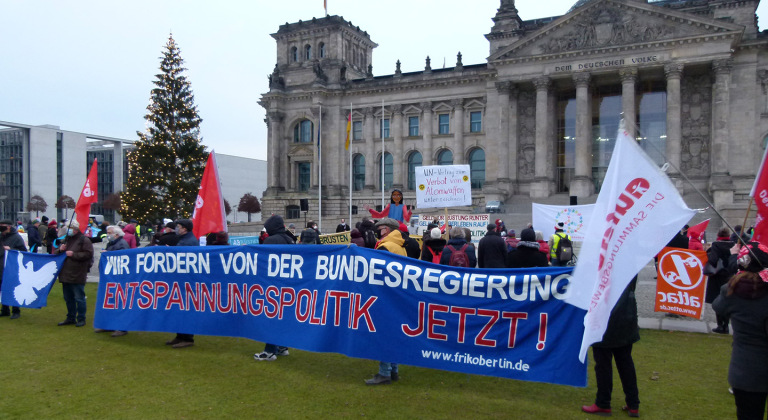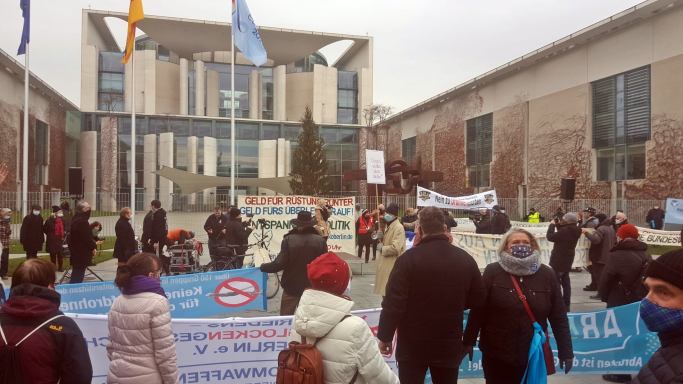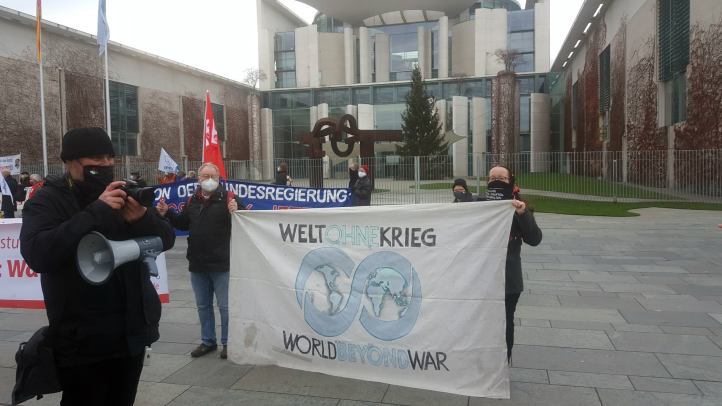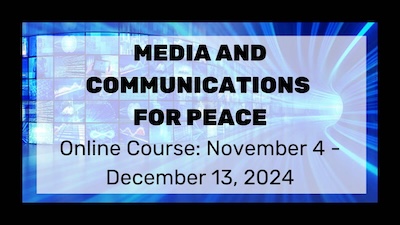
From Co-op News, December 8, 2020
Reiner Braun and Willi van Ooyen from the initiative’s working committee explain the evaluation of the nationwide, decentralized Day of Action on December 5, 2020 of the initiative “Disarmament instead of Armament”.
With more than 100 events and several thousand participants, the nationwide Day of Action of the initiative “Disarmament instead of Armament” – under Corona conditions – was a great success.
Peace initiatives all over the country, together with trade unions and environmental associations, made this day their day and took to the streets with great ideas and imagination in view of the limited scope for action nationwide for peace and disarmament. Human chains, demonstrations, rallies, vigils, public events, collections of signatures, information stands shaped the image of the over 100 actions.

Further signatures for the petition “Disarmament instead of Armament” were collected in preparation and implementation of the day of action. So far, 180,000 people have signed the appeal.
The basis of all actions was the rejection of further arming the Federal Republic of Germany with new nuclear weapons and arming of drones. The defense budget has been inflated to 46.8 billion, and should thus be increased by almost 2%, according to NATO criteria. If one takes into account the military and armaments expenditure from other budget in which they are hidden, the budget is 51 billion.
The 2% GDP for armaments and military are still firmly part of the political agenda of the overwhelming majority in the Bundestag. That means at least 80 billion for war and arms industry profits.

Health instead of bombs, education instead of the military, the protesters clearly demanded social and environmental priority. A socio-ecological peace transformation was called for.
This day of action encourages further activities and campaigns. The Bundestag election campaign in particular is a challenge in which demands for peace, a policy of détente and disarmament should be interfered with.
Members of the working committee of the initiative “Disarmament instead of Armament”:
Peter Brandt (Neue Entspannungspolitik Jetzt!) | Reiner Braun (International Peace Bureau) | Barbara Dieckmann (Präsidentin der Welthungerhilfe a.D.) | Thomas Fischer (DGB) | Philipp Ingenleuf (Netzwerk Friedenskooperative) | Christoph von Lieven (Greenpeace) | Michael Müller (Naturfreunde, Staatssekretär a. D.) | Willi van Ooyen (Bundesausschuss Friedensratschlag) | Miriam Rapior (BUNDjugend, Fridays for Futures) | Ulrich Schneider (Geschäftsführer Paritätischer Wohlfahrtsverband) | Clara Wengert (Deutscher Bundesjugendring) | Uwe Wötzel (ver.di) | Thomas Würdinger (IG Metall) | Olaf Zimmermann (Deutscher Kulturrat).









One Response
In mid-January 2021, the International Treaty on the Prohibition of Nuclear Weapons will enter into force internationally. The imposition of the 50th ratification of the agreement was announced at the UN headquarters in New York on 24 October 2020. This is another very important international security milestone on the road to full and unconditional nuclear disarmament under the International Treaty and under strict international control. Nuclear weapons will become weapons prohibited under applicable international law, regardless of the opposition of individual nuclear powers.
We must make it clear that this will create a whole new international situation that will open up far more space and opportunities for all humanity, led by the anti-nuclear movement, to put political and further pressure on all nuclear weapons owners to phase them out under strict international control. Thus, especially in Germany, Italy and the Netherlands, political and security pressures seeking to bring American nuclear weapons deployed in these countries back to American soil can be expected to intensify significantly. Other US nuclear weapons are also deployed in Belgium and Turkey.
In general, it can be predicted that the entire complex and sensitive area of nuclear weapons and nuclear disarmament since the end of January 2021 could be fundamentally affected by the new American President Joe Biden. The first estimates are optimistic in terms of the first steps to increase confidence in nuclear weapons, reduce their operational readiness on both sides and their further gradual reduction on both the American and Russian sides. New US President Joe Biden will play a key role in further modifying military-political relations with Moscow.
There is no doubt that the safety of nuclear weapons and related international agreements is a top priority in international relations between the United States and the Russian Federation.
New US President Joe Biden was vice president in the administration of former US President Barack H. Obama. As is well known, US President Obama made a historic speech in Prague in 2009 on the need to destroy nuclear weapons, as detailed above. All this suggests that we can now be mildly optimistic and believe that US-Russian relations will stabilize in 2021 and gradually improve.
However, the road to full nuclear disarmament is likely to be difficult, complicated and lengthy. However, it is quite real and there will undoubtedly be campaigns on various petitions, statements, calls and other peace and anti-nuclear initiatives, where there will be ample opportunities for “ordinary citizens” to speak as well. If we want our children and grandchildren to live in a safer world, a world without nuclear weapons, we will certainly unequivocally support such peaceful anti-nuclear actions.
We can also expect, as early as 2021, a series of peace marches, demonstrations, happenings, seminars, lectures, conferences and other events that will clearly support the rapid, safe and environmentally sound destruction of all nuclear weapons, including their means of delivery. Here, too, mass participation of citizens in various parts of the world can be expected.
The optimistic visions of the United Nations express considerable hope that the complete destruction of current nuclear weapons will be achieved as early as 2045, the centenary of the United Nations.